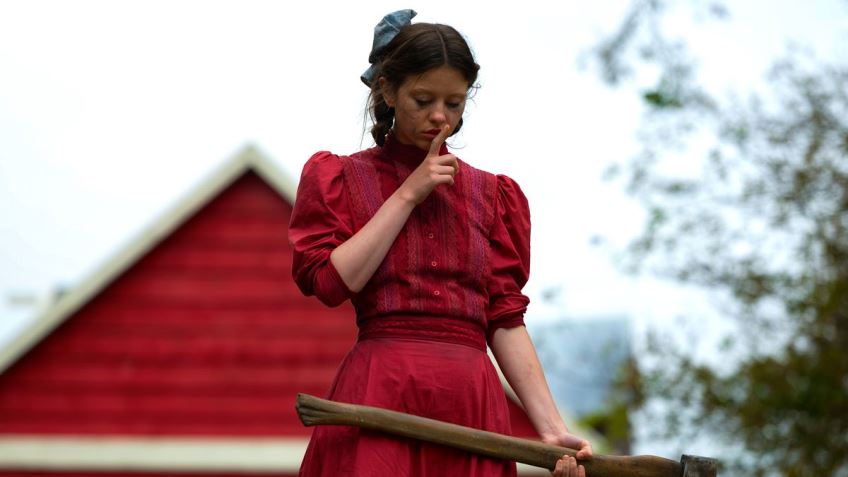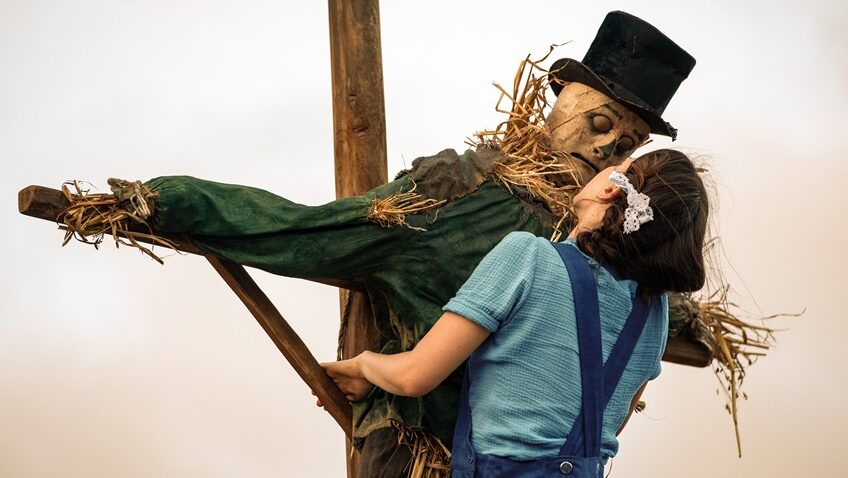Joyce Glasser reviews Pearl: An X-traordinary Origin Story (March 17, 2023) Cert 15, 102 mins.
Pearl is a slasher and it’s all the more gruesome because it is so well made. The upside is that you are guaranteed to be glued to your seat, gripping the armrests from beginning to end. Co-writer (with his star, Mia Goth) and director Ti West knows how to create atmosphere, tension and gloriously lit interiors.
And his muse, Mia Goth (Emma, High Life) gives an inventive, pitch-perfect performance as the disillusioned eponymous farm girl grasping onto a thwarted dream to escape her banal future in a dysfunctional family. But what raises the bar are the historical undertones. Pearl’s mother is a German immigrant in a hostile environment in World War I, and the action is set in rural Texas, during the influenza epidemic that was wiping out soldiers and civilians alike.
The film is called Pearl, but West adds the subtitle to connect the film to last year’s X which was shot back-to-back with Pearl, a film always intended to be an origins story. So even if you missed X you can still “enjoy” the prequel.
X takes place circa the late 1970s and in that film Goth plays two women: a young woman named Maxine and an elderly woman named Pearl. You have to hand it to Goth who was playing three roles almost simultaneously and washing the ketchup off her hands all day.
It is 1918 and Pearl’s new husband Howard is still off at war. It is later revealed that this Maggie May with dreams of being a dancer and film star, married Howard to get away from her suffocating family life. She is becoming worried that he will want to settle down to a peaceful farm and family life after the war.

But anything is better than living with her Puritanical mother (Tandi Wright) who immigrated from Germany, along with some eight million other Germans in the late 19th and early 20th centuries and integrated. But with the outbreak of war, she began to avoid the community because of anti-German hysteria. This isolation is further aggravated by her father (Matthew Sutherland), who appears to have served in the war but is now at home, paralyzed. He can neither talk nor feed or wash himself.
It’s a hard life, but Pearl’s dour mother derives a sadistic kick out of making it harder for her daughter, refusing to inject any pleasure into their punishing routine. When she sends Pearl on the long, hot bicycle ride into town for her husband’s morphine, and Pearl returns a few cents short, she is sent to bed with no dinner. Pearl is no wronged angel, and when a goose interrupts her dance routine, she seizes the pitch fork – her weapon of choice, against anything or anyone who obstructs her progress.
A chance encounter with a handsome, itinerant projectionist (David Corenswet) is the trigger for the furious momentum that builds like the eruption of a volcano. And it continues to the end when Pearl prepares a grotesque dinner table for Howard who is cheerfully returning from one battlefield to another. But we’re getting ahead of ourselves.
On the way home from town the day Pearl meets the projectionist, Pearl stops off in a field to liberate a scarecrow on a pole. In what must be the craftiest homage to The Wizard of Oz ever conceived she begins to fantasise about the handsome drifter. Her slow dance with the scarecrow, works up to a masturbation scene that would have sent Toto running back to Kansas.
No sooner home, she is brought back from Oz abruptly by her mother’s fury that eight cents in change is missing, which Pearl claims she used to buy a snack for the long ride home. Pearl again seeks solace with the projectionist and confides in him that she cannot abandon her family but wishes they would just die. He shows her a “stag” film that he acquired in France. Rather than offending her, it reminds Pearl of the freewheeling life he leads that she can only dream of.

When her more prosperous, sister-in-law Mitsy (Emma Jenkins-Purro) comes by with her mother to deliver a pig for Sunday dinner, another stab at her dream emerges. Mitsy unwittingly dangles an alternative escape route before Pearl, and by doing so, becomes implicated in her plans.
Mitsy, pretty, with blond banana curls and a frilly, stylish dress, tells Pearl about a talent audition she is going to enter. They are looking for a dancer for a show that will go on the road and the auditions are upcoming at a local Church hall.
As Pearl is practising, her mother finds a programme from the cinema and a violent altercation erupts, during which the mother’s dress catches fire in sight of the helpless father. His eyes, the only part of his body that can move, open wide with terror.
West makes use of the horror film tropes but embellishes them in his Southern Gothic slasher, replete with psychological flourishes, including two relatively lengthy confessions that add to the tension. In one unbearable scene, Mitsy, comforting her sister-in-law after a bad break, asks Pearl to confide in her what she claims she is unable to tell Howard. By now we know that Pearl doesn’t take well to rejection.
What makes all this palatable is not only the rich texture of the film, but the underlying humour which, dark as it is, becomes a defensive shield. Conveniently, for anyone who needs to dispose of bodies efficiently, for example, the farmhouse overlooks a lake where Pearl need only call the resident crocodile, Theda, for a mutually-beneficial exchange. Of course, Theda is Pearl’s name for her equally voracious aquatic friend. During the first world war Theda Bara was 20th Century Fox’s biggest silent movie star. She was known as a femme fatale, or “The Vamp”.




